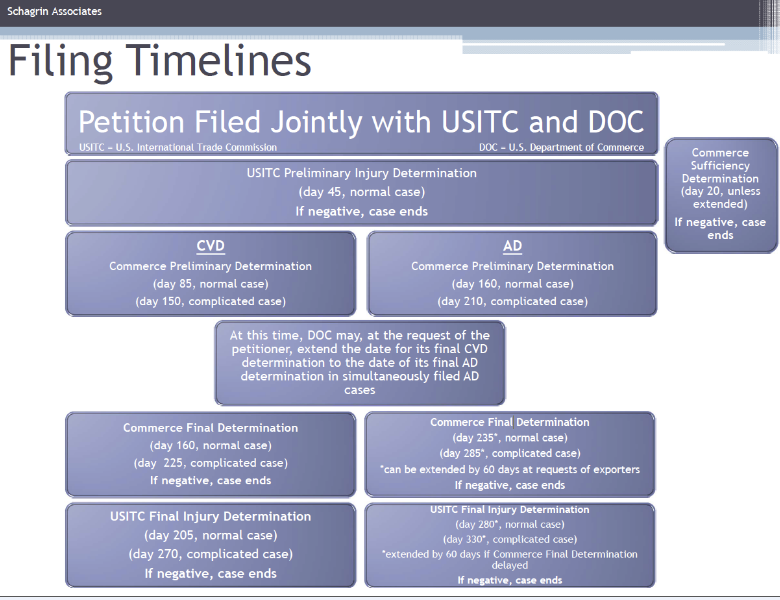Government/Policy

August 18, 2015
Important Dates for Hot Rolled, Cold Rolled & Corrosion Resistant (CORE) Trade Suits
Written by John Packard
With three direct flat rolled trade cases plus various suits affecting pipe and tube and oil country tubular goods, keeping track of all of the important dates can be mind-numbing. Especially when critical circumstances are alleged or extensions are requested (and we have seen both already in the CORE suit).
We asked trade attorney Lewis Leibowitz to assist us in understanding the due dates for all of the various flat rolled steel antidumping (AD) and countervailing duty petitions.
Hot Rolled Suit: Australia, Brazil, Japan, South Korea, Netherlands, Turkey, United Kingdom
The hot rolled petition was the most recent one filed having been filed on Tuesday, August 11th. In approximately 21 days from the filing of the petition the U.S. Department of Commerce will file a “Sufficiency Determination” on the merits of the petition (August 31st which will be available to the public on September 1st at noon). If accepted (which is normally the case) then 20 days later the attorneys will get “Scope comments” which will lift any ambiguity about whether or not any specific mill is/is not covered by the petition. The one mill that has been excluded in the past has been POSCO out of Korea. SMU understands from one of the attorneys representing the steel mills that “all” Korean producers are included in the petition. The scope comments are expected on or about September 20th.
HRC Countervailing Duty
Leibowitz told us regarding the date when cash deposits would be due from the importers of record, “The current date for the ITC preliminary determination is September 25. That date is not relevant for cash deposits. The ITC vote will be public and will be a few days before the 25th. The Commerce preliminary determination announcement date is 85 days after the petition (65 days after initiation) for CVD. By my calculation, that will be November 4. Publication will be about 7 days later, or November 11. Weekends and holidays extend the date. Nov. 11 is a holiday, so publication might be on the 10th or the 12th. That is relevant for cash deposits.”
HRC Antidumping
“Cash deposits will be due for entries on or after the publication date of the Commerce preliminary determination. If critical circumstances are found early, the date will still be 90 days before the Commerce publication date for the preliminary determination. That date will not be known until later. AD/CVD cash deposits will not be required for entries until the publication date of the preliminary determination. But the liability for those deposits will be known in advance. Shipments already en route to the United States could be stuck with this liability.”
Cold Rolled Suit: China, Brazil, India, Japan, South Korea, Netherlands, Russia, United Kingdom
The cold rolled antidumping and countervailing duty petition was filed on July 28, 2015. The US DOC Sufficiency Determination is due 21 days after the filing or August 18th (today). The US DOC did split the suit into two camps: one where the countries will be investigated for AD and CVD – those countries were: Brazil, China, India, Korea and Russia. The US DOC also found that AD investigations would continue on CR products from Japan, the Netherlands and the United Kingdom. These three countries will not face CVD investigations.
As in the graphic shown above, the US ITC Preliminary Determination is due 45 days after the filing of the petition.
Corrosion Resistant Suit (coated steels: galvanized & Galvalume) or CORE: China, India, Taiwan, South Korea, Italy
Trade case was filed on June 3, 2015 and 20 days later the U.S. Department of Commerce found there was enough information to allow the suit to continue.
On July 24th the domestic steel mills filed an allegation of “Critical Circumstances” which essentially charges that the foreign mills involved in the suit have exceeded the 15 percent “surge” threshold after the suit was filed (or in the case of this allegation the mills are saying that the countries involved knew before the suit was even filed that it was coming and, therefore, increased their shipments in order to beat any duty deadline).
The Critical Circumstances investigation is under way. On August 4-5, the US Department of Commerce sent out questionnaires requesting monthly shipment data from respondents. The original due date for the first batch of data was August 17th. Last week, Commerce granted extensions to two Italian companies until August 27th. SMU and our sources have not yet seen any notice from Commerce indicating when they would make a preliminary determination on critical circumstances. The law requires that it be done not later than the date of the Preliminary Determinations which are due (as of now) on November 2, 2015 for CVD.
On August 3rd the petitioners (steel mills) requested an extension asking that the Preliminary Determination on the CVD (countervailing duty) portion of the CORE suit be moved from August 27th to November 2nd which is the maximum extension allowed by legal statute. On August 13th their request for an extension was granted and the due date change to November 2, 2015 was confirmed.
The AD (antidumping) portion of the CORE suit deadline for Preliminary Determination is October 16th. However, in mid-September an extension can be requested that would move the deadline into early January 2016.
Lewis Leibowitz told us when we questioned him about the petitioners request for an extension and its impact on Critical Circumstances, “As for critical circumstances, regardless of the determination date, the entries affected by critical circumstances are only those 90 days or less before the publication date of the preliminary determination. If the preliminary determination is postponed, the effective date will be postponed too. So, Petitioners are prejudiced, but in practice not by much.”
He went on to say, “The publication date of the determinations is the effective date for cash deposits. The 7 day lag from announcement of the determinations until FR publication is an estimate and could vary.”
Steel Market Update will continue to update information about the various trade suits as it becomes available.








